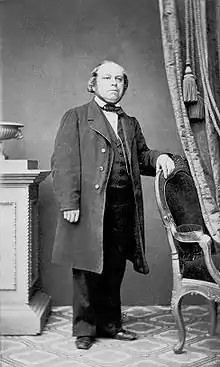Louis Plaidy | |
|---|---|
 | |
| Born | November 28, 1810 Hubertusburg, Saxony |
| Died | March 3, 1874 (aged 63) Grimma, Saxony |
| Nationality | German |
| Occupation | Piano pedagogue |
| Notable work | Technische Studien: für das Pianofortespiel |
Louis Plaidy (28 November 1810 – 3 March 1874) was a celebrated German piano pedagogue and compiler of books of technical music studies.[1][2]
Life
Born in Hubertusburg, Saxony, Plaidy initially focused on the violin, and toured as a concert violinist, but he later studied the piano, particularly the technical aspects of playing.[1] Plaidy was renowned for his ability to impart technical skills to his students.[3]
In 1843, Felix Mendelssohn invited Plaidy to join the faculty of the Leipzig Conservatory to teach the piano.[1] The Conservatory attracted many international students, including the original directors of the Oberlin Conservatory (founded in 1867 in Ohio, US), who went on to use Plaidy's piano methods.[4] Plaidy was Edvard Grieg's first piano teacher at the Conservatory,[5] although Grieg found Plaidy's style of teaching uninspiring.[6] Plaidy remained at the Conservatory until 1865, when he went on to teach piano students privately.[1]
Plaidy published a book on piano pedagogy, Technische Studien für das Pianofortespiel, which was highly thought of and is still used today,[1][3] and a pamphlet, Der Klavierlehrer, said to be of little worth.[1][7]
He died in Grimma, Saxony, aged 63.
Notable students
See: List of music students by teacher: N to Q#Louis Plaidy.
Plaidy's notable students included:
- Dudley Buck, American composer.[8]
- Hans von Bülow, German conductor, virtuoso pianist, and composer.[9]
- Frederic Hymen Cowen, British composer.[10]
- Gustave Gagnon, Canadian organist and composer.[11]
- Frederick Grant Gleason, American composer and director of the Chicago Conservatory.[12]
- Edvard Grieg, Norwegian composer and pianist.[5]
- Leoš Janáček, Czech composer.[13]
- Michael Maybrick, English singer and composer.[14]
- James Cutler Dunn Parker, American organist, educator and composer.[15]
- Oscar Paul
- Julius Röntgen, German-Dutch composer.[16]
- Ernst Rudorff, German composer.[17]
- Samuel Sanford
- Gustav Schreck, German composer.[18]
- Arthur Sullivan, English composer.[19]
- Franklin Taylor, English pianist and piano pedagogue[20]
Works
- Technische Studien: für das Pianofortespiel (in German). Leipzig: Breitkopf & Härtel. 1868.
- Der Klavierlehrer [The piano teacher] (in German). Leipzig: Breitkopf & Härtel. 1874.
References
- 1 2 3 4 5 6 Riemann, Hugo (1908). Encyclopaedic Dictionary of Music. Translated by Shedlock, J.S. Philadelphia, PA: Theo. Presser.
- ↑ Bache, Constance (1901). Brother Musicians: Reminiscences of Edward and Walter Bache. London: Methuen & Company. p. 87.
- 1 2 Dubal, David (2004). "Louis Plaidy". The Art of the Piano: Its Performers, Literature, and Recordings (3rd ed.). Pompton Plains, N.J.: Amadeus Press. p. 275. ISBN 9781574670882.
- ↑ Parakilas, James (2002). "The piano lesson". Piano Roles: A New History of the Piano. Yale Press. p. 126. ISBN 9780300093063.
- 1 2 Carley, Lionel (2006). "Chapter 2: The Leipzig student and some English Contemporaries". Edvard Grieg in England. Woodbridge: Boydell Press. p. 9. ISBN 9781843832072.
- ↑ Johansen, David Monrad (1938). Edvard Grieg. Princeton University Press. p. 35.
- ↑ Eschmann, Johann Carl (1900). J. C. Eschmann's Wegweiser durch die Klavier-Litteratur (in German) (5th ed.). Leipzig: Gebruder Hug & Co. p. 10.
- ↑ Orr, N. Lee (2008). "Chapter 1. Beginnings". Dudley Buck. Urbana: University of Illinois Press. p. 6. ISBN 9780252032790.
- ↑ Randel, Don Michael, ed. (1996). The Harvard biographical dictionary of music. Cambridge, Mass.: Belknap Press of Harvard University Press. p. 117. ISBN 978-0-674-37299-3.
- ↑ Chisholm, Hugh, ed. (1911). "Cowen, Frederic Hymen". Encyclopædia Britannica. Vol. 7 (11th ed.). Cambridge University Press. p. 346.
- ↑ Brassard, François; Smith, Gordon E.; Ménard, Denise (15 December 2013). "Gustave Gagnon". The Canadian Encyclopedia. Retrieved 2018-01-21.
- ↑ Howe, Granville L.; Mathews, William Smythe Babcock (1889). "Frederick Grant Gleason". A Hundred Years of Music in America. G.L. Howe. p. 698.
- ↑ Tyrrell, John (2011). "Musical studies: Leipzig 1879–80". Janacek: Years of a Life (1854-1914): The Lonely Blackbird. Vol. 1. Faber & Faber. ISBN 9780571261130.
- ↑ Pyle, Ingram A. (1901). "Music and musicians. The composer of "The Holy City" and "The Star of Bethlehem"". Book Notes: A Monthly Literary Magazine and Review of New Books. Vol. 6. Siegel-Cooper. p. 488.
- ↑ Lahee, Henry Charles (1903). "Chapter X: American organists". The Organ and Its Masters. L. C. Page. p. 251.
- ↑ Hartog, Jacques (December 1905). "Julius Röntgen". The Musiclovers Calendar. Vol. 1. Boston: Musiclovers Company. p. 24.
- ↑ Clive, Peter (2006). "Rudorff, Ernst (Friedrich Karl)". Brahms and His World A Biographical Dictionary. Lanham: Scarecrow Press. p. 377. ISBN 9781461722809.
- ↑ Mason, Daniel Gregory (1917). The art of music : a comprehensive library of information for music lovers and musicians. Vol. 12. New York: National Society of Music. p. 167. OCLC 3026244.
- ↑ Ainger, Michael (2002). "Chapter Three. 1858-1862. Sullivan at Leipzig; Gilbert at Law". Gilbert and Sullivan : a dual biography. New York: Oxford University Press. p. 37. ISBN 978-0-19-514769-8.
- ↑ George Grove, revised by Jean Mary Allan (2001). "Taylor, Franklin". Grove Music Online. Oxford University Press. doi:10.1093/gmo/9781561592630.article.27588.